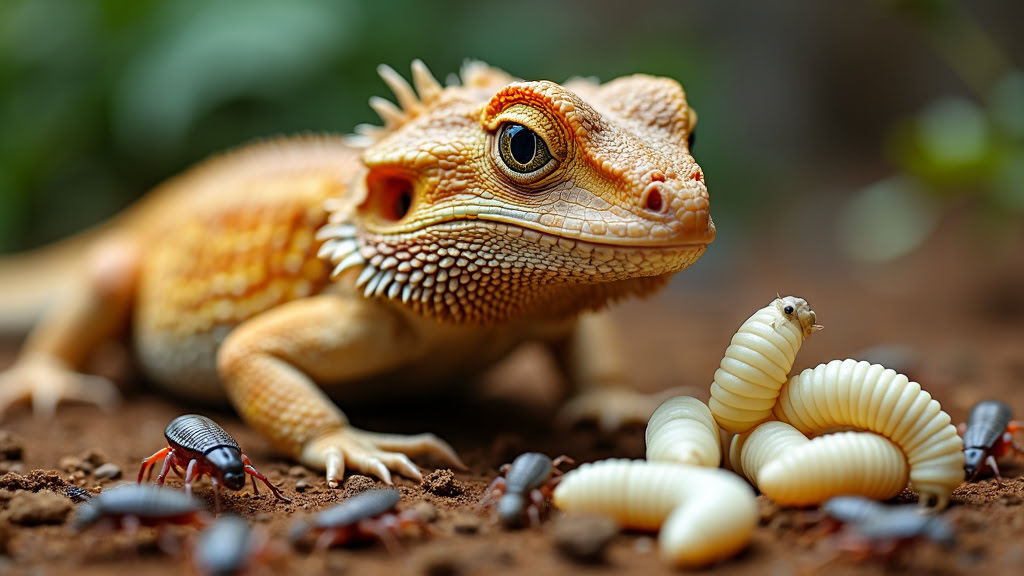Have you ever looked at your bearded dragon and wondered, “Can you eat waxworms?” You’re not alone. Bearded dragons have become very popular pets because they are calm and look like mini dragons. But like all pets, they need the right kind of food to stay healthy. In this blog, we at Dug’s Bugs will talk about whether waxworms are a good food choice for your scaly friend.
Understanding Bearded Dragon Dietary Needs
Natural Diet in the Wild
Bearded dragons are omnivores, which means they eat both plants and animals. In the wild, they eat a mix of insects, small animals, fruits, and plants. This mixed diet helps them get all the nutrients they need to survive.
General Dietary Requirements in Captivity
When kept as pets, bearded dragons need a variety of foods to stay healthy. A good diet for pet bearded dragons includes a mix of insects, vegetables, and sometimes fruits. Offering different kinds of food is important to make sure they get all their vitamins and minerals.
What Are Waxworms?
Nutritional Profile of Waxworms
Waxworms are the larvae of the wax moth. They have a unique nutrition profile. They are high in fat and have less protein compared to other insects. They also have a lot of moisture. While they are not a superfood for humans, they can be an interesting option for your bearded dragon.
Benefits of Waxworms in a Bearded Dragon’s Diet
Bearded dragons love the taste of waxworms, making them a favorite treat. They are also easy to digest, which makes them good for younger dragons or those recovering from being sick.
Risks of Overfeeding Waxworms
However, there is a downside. Waxworms are very high in fat, which can make your dragon overweight if they eat too many. Overfeeding can cause health problems like fatty liver disease and shorten their lifespan. It’s important to feed them in moderation.
Incorporating Waxworms Into Your Bearded Dragon’s Diet
How Often to Feed Waxworms
Because waxworms are high in fat, they should not be a regular part of your dragon’s diet. Giving them once a week as a treat is a good rule. This way, your dragon can enjoy the treat without missing out on other important nutrients.
How Many Waxworms are Safe to Offer
Portion control is important. For adult bearded dragons, giving 5-6 waxworms per feeding is usually safe. For younger dragons, limit it to 2-3 waxworms. Always think about the age and size of your dragon when deciding how much to feed them.
Personal Experience with Feeding Bearded Dragons Waxworms
From my own experience with bearded dragons, I’ve noticed they love waxworms. They are like the cheese puffs of the reptile world—super yummy! But I learned the hard way about feeding too many. My dragon, Spike, got a bit chubby from too many waxworms. I started giving him fewer waxworms and more greens and crickets. He got back to a healthy weight. Lesson learned!
Alternative Insects for Variety
Staple Insects
To keep your dragon happy and healthy, offer a variety of insects. Crickets and Dubia roaches are great staple insects. They provide good protein without too much fat. Black soldier fly larvae are also good because they have a lot of calcium.
Occasional Treats
Besides waxworms, other insects can be given as treats. Mealworms, superworms, and hornworms are tasty options that your bearded dragon will like. But remember, treat foods should not be given too often.
Important Supplements for Bearded Dragons
Bearded dragons also need supplements to stay healthy. Calcium and vitamin D3 are very important for their bones. Dusting insects with a calcium supplement 3-4 times a week and giving a multivitamin supplement once a week is recommended. These supplements help make sure your dragon gets a balanced diet.
Monitoring and Adjusting Your Bearded Dragon’s Diet
Signs of Nutritional Imbalance
Watch for signs that your dragon’s diet is off. Signs include being tired, not eating, losing or gaining weight, and changes in stool. If you see any of these signs, talk to a vet.
Regular Weigh-ins and Health Checks
Weigh your dragon regularly to track their health. Keeping a log of their weight and noting any changes in behavior or appetite can be very helpful. It’s also a good idea to have a vet check your dragon at least once a year.
Conclusion
Waxworms can be a tasty treat for your bearded dragon, but they should be given in small amounts because they are high in fat. Balancing waxworms with other healthy foods and the right supplements is the best way to keep your bearded dragon healthy. Always talk to your vet for personalized diet advice and keep an eye out for any signs of nutritional imbalance.
Additional Resources
We didn’t include any external links here, but we recommend talking to a local exotic pet vet for more specific advice for your bearded dragon. Stay tuned to Dug’s Bugs for more articles on exotic pet care!
Call to Action
Do you have any funny stories about your bearded dragon’s food preferences? Share your experiences and questions in the comments below! And don’t forget to subscribe to our blog for more tips on taking care of bearded dragons and other exotic pets. Let’s make caring for these scaly friends exciting!




